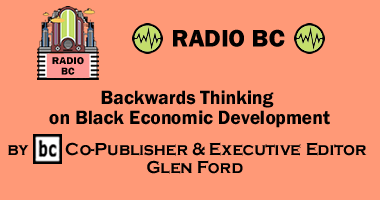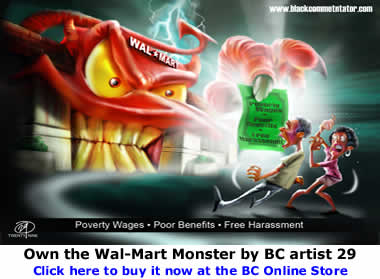
|
|||||||||||||||||||||
 |
|||||||||||||||||||||
|
There exists in the African American political conversation a great disconnect on the subject of “economic development.” Among some Black political tendencies, the term “economic development” is thought to be synonymous with individual entrepreneurship. That’s a very narrow definition of economic development, one that reduces most Blacks to the role of mere potential customers, who are expected to support individual Black businesspeople as if the survival of the Race depended on it.
In more extreme cases, devotees of business development as the engine of Black economic uplift even sneer at mass mobilization to create public projects and employment. Demanding that government take the lead in development amounts to begging “the white man” for money, they say – as if public funds were not our money, too. These guys – and most of them are
guys – have it backwards. Economic development
in the inner city requires that the residents
be employed in good jobs, at a living wage, so
that Small retailers also require thick population densities in order to gather sufficient customers – the poorer the customers, the more that are required to keep local merchants afloat. But population densities are a result of public policy. Black businesses cannot even save themselves without the protection of an empowered Black public. In the future, we must stop defining Black economic development as limited to Black business development. The best thing that can happen for Black business is a living wage for Black workers. If we are going to have an economic development conversation, let’s get our priorities straight, and stop talking backwards. For Radio BC, I’m Glen Ford. You can visit the Radio BC page to listen to any of our audio commentaries voiced by BC Co-Publisher and Executive Editor, Glen Ford. We publish the text of the radio commentary each week along with the audio program. |
|
| Home | |
Your comments are always welcome. Visit the Contact Us page to send e-Mail or Feedback or Click here to send e-Mail to [email protected] e-Mail re-print notice
If you send us an e-Mail message we may publish all or part of it, unless you tell us it is not for publication. You may also request that we withhold your name. Thank you very much for your readership. |
|
| April 27, 2006 Issue 181 |
||||||||||||||
|
||||||||||||||
|
||||||||||||||
| Printer Friendly Version of article | ||||||||||||||
 |
||||||||||||||
 |
||||||||||||||
| |
||||||||||||||
| |
||||||||||||||






























